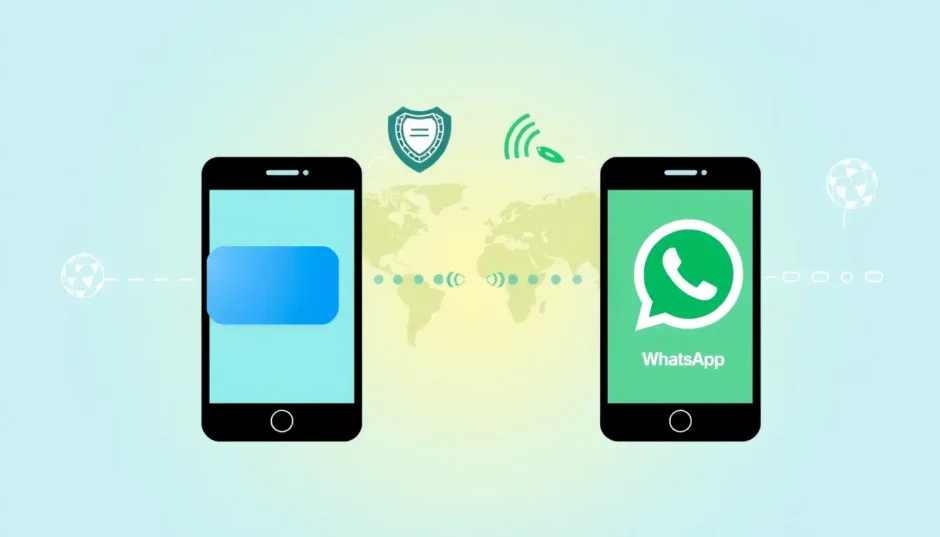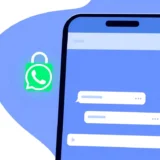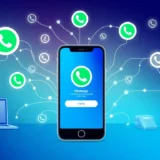TL;DR: The debate over whatsapp vs imessage often boils down to ecosystem lock-in versus global reach. While iMessage offers deep integration for Apple users, whatsapp and imessage differ strongly in cross-platform compatibility and feature sets, raising questions about is imessage safer than whatsapp.
When it comes to messaging apps, two names consistently dominate conversations: iMessage and WhatsApp. Both platforms have revolutionized how we communicate, but they approach messaging from different angles. The ongoing debate about whatsapp vs imessage continues to intrigue users worldwide, with each app having its loyal followers and distinct advantages.
Whether you’re an iPhone loyalist or someone who communicates across multiple platforms, understanding the nuances between these two messaging giants can significantly impact your daily communication experience. The choice between whatsapp and imessage often comes down to your device ecosystem, privacy concerns, and the types of conversations you typically have.
Table of Contents
- Understanding the Core Differences: iMessage vs WhatsApp
- Platform Availability and Compatibility
- Messaging Features Comparison: whatsapp vs imessage
- Security and Privacy: Is iMessage Safer Than WhatsApp?
- Platform Ecosystems and Device Experience
- Feature Deep Dive: When WhatsApp Offers More
- The Data Dilemma: Refining the is imessage safer than whatsapp Question
- International Communication and whatsapp and imessage Adoption
- Future Trends Shaping the whatsapp vs imessage Future
- Deciding Between whatsapp vs imessage: A Personal Calculus
- Final Verdict: Coexistence is Key
Understanding the Core Differences: iMessage vs WhatsApp
At first glance, iMessage and WhatsApp might seem similar—both allow you to send messages, photos, videos, and make calls. However, their underlying philosophies and technical implementations differ substantially. The fundamental distinction lies in their platform availability and target audiences.
iMessage functions as Apple’s native messaging system, seamlessly integrated into the Messages app on iPhones, iPads, and Macs. It automatically detects when you’re messaging another Apple user and switches to iMessage mode, offering enhanced features.
WhatsApp, conversely, operates as a standalone application available across iOS, Android, and even desktop platforms, creating a unified messaging experience regardless of your device. The conversation around whatsapp vs imessage often highlights this platform independence as a key differentiator.
The ongoing discussion about whatsapp vs imessage international usage highlights another critical difference. While iMessage excels within Apple’s ecosystem, WhatsApp dominates global communications, particularly in countries where it has become the de facto standard for messaging. For instance, in many international communities, WhatsApp is the expected standard.
Platform Availability and Compatibility
The platform availability represents one of the most significant differentiators in the whatsapp vs imessage debate. Your choice might already be made for you depending on what devices you and your contacts use regularly.
iMessage Exclusivity
iMessage remains exclusively available within Apple’s ecosystem. If you own an iPhone, iPad, or Mac, iMessage comes pre-installed and ready to use. However, this exclusivity means Android users are completely excluded from the iMessage experience. When you message someone without an Apple device, your iPhone automatically reverts to standard SMS/MMS messaging, which lacks many of iMessage’s premium features like rich media and read receipts.
WhatsApp’s Cross-Platform Reach
WhatsApp takes a completely different approach to accessibility. The app is available for both iOS and Android devices, along with desktop applications for Windows and Mac computers. This cross-platform compatibility makes WhatsApp incredibly versatile for users who frequently switch between devices or communicate with people using different operating systems. This versatility is why many users find whatsapp and imessage comparison leans toward WhatsApp for broad connectivity.
The question of whatsapp vs imessage international compatibility heavily favors WhatsApp. In many countries outside the United States, WhatsApp has become the standard messaging platform, while iMessage remains predominantly popular in North America among Apple users. Conversations originating outside the US often mandate the use of WhatsApp.
Messaging Features Comparison: whatsapp vs imessage
When evaluating whatsapp vs imessage from a feature perspective, both platforms offer robust messaging capabilities but with distinct approaches that cater to different user preferences and needs. Some users prefer the native feel, while others prioritize WhatsApp’s advanced feature set.
iMessage Exclusive Features
iMessage shines with features deeply integrated into Apple’s ecosystem. The app offers iMessage reactions that let you respond to specific messages with taps that translate into emoji responses. Memojis represent another standout feature—these customizable animated avatars can mirror your facial expressions and create a more personalized messaging experience.
Furthermore, iMessage supports Apple Pay integration, allowing you to send money directly through messages. iMessage games and collaborative tools enable you to play games with friends or work on documents together without leaving the conversation. The seamless synchronization across Apple devices is a huge draw for those fully immersed in the Apple world.
WhatsApp’s Messaging Strengths and whatsapp and imessage Differences
WhatsApp counters with features designed for practical communication needs. The disappearing messages function allows you to set timers on messages so they automatically delete after a specified period—perfect for sharing sensitive information or maintaining conversation cleanliness. Additionally, you can send view-once media, which is a feature commonly requested but not natively mirrored in iMessage for all situations.
WhatsApp’s group chat support for up to 1,024 participants dwarfs iMessage’s limit (which is often cited as 256 or less across different iterations), making it superior for large community conversations. The introduction of WhatsApp Communities further enhances this organizational capacity.
The broadcast lists feature enables you to send messages to multiple contacts simultaneously without creating a formal group, ideal for announcements where you don’t need responses from everyone. WhatsApp Status, similar to Instagram Stories, lets you share updates that disappear after 24 hours, adding a social media dimension to the messaging experience. Comparison of features often shows WhatsApp leading in functionality depth.
iMyFone ChatsBack.Retrieve deleted WhatsApp messages and attachments directly from iOS/Android device; Restore deleted WhatsApp messages from iCloud backup/Google Drive backup/iTunes backup; Preview recoverable WhatsApp data before performing the final recovery; Get deleted WhatsApp & WhatsApp Business data back to iPhone/Android device; Recover WhatsApp data to PC as HTML/PDF/Excel/CSV files; Compatible with iOS/Android/Windows/macOS.
Check More Details | Download Now! | Check All Deals
Security and Privacy: Is iMessage Safer Than WhatsApp?
The critical question of is imessage safer than whatsapp deserves careful consideration, as both platforms take security seriously but implement protection differently. Understanding these nuances helps in making an informed decision based on personal privacy requirements.
End-to-End Encryption (E2EE) Comparison
Both iMessage and WhatsApp employ end-to-end encryption (E2EE), meaning messages are scrambled during transmission and can only be decrypted by the intended recipient. This prevents outside parties, including the service providers themselves, from reading your message content in transit. However, it’s how this encryption is applied that causes debate between whatsapp vs imessage users.
WhatsApp enables E2EE by default for all conversations, including direct messages and group chats. This consistent application offers a high baseline for universal protection.
iMessage provides E2EE only when communicating between Apple devices (blue bubbles). If you text an Android user, the message reverts to standard SMS/MMS, which is not end-to-end encrypted and is essentially sent in the clear. This inconsistency is a major point in the is imessage safer than whatsapp discussion, particularly when users mix platform usage.
Metadata Concerns and Trust in Meta
Security isn’t just about message content; it’s also about metadata—who is talking to whom, when, and how often. Here, the companies behind the apps create stark differences in user trust. Many users, especially those concerned with privacy, point out that while whatsapp and imessage encrypt content differently, the metadata handling is a serious concern for whatsapp vs imessage.
WhatsApp, owned by Meta, collects significant metadata (contacts, timestamps, IP addresses) which is used for analytics and potentially targeted advertising. Even if the message content is secure, this metadata can reveal a great deal about a user’s social graph and habits, feeding into Meta’s broader data ecosystem. This trust issue often drives users away from WhatsApp, despite its superior cross-platform features.
iMessage, generally, collects less metadata compared to WhatsApp. Apple prides itself on a more privacy-focused approach, claiming not to extensively mine metadata for advertising purposes. However, iMessage backups to iCloud can be a vulnerable point if Advanced Data Protection isn’t enabled, as Apple previously held the keys to decrypt those backups.
When asking is imessage safer than whatsapp, in a pure E2EE application across all chats, WhatsApp has a slight technical edge because its E2EE is mandatory, whereas iMessage drops to insecure SMS when contacting Android users. Yet, user trust regarding Meta’s metadata practices often swings the argument back toward Apple for many in the US.
Platform Ecosystems and Device Experience
The core divergence between whatsapp vs imessage lies in ecosystem philosophy. One is open and universal; the other is proprietary and tightly integrated.
iMessage: The Apple Walled Garden
iMessage excels when you talk to someone else using an Apple device. Features like Memojis, seamless synchronization across your MacBook, iPad, and Apple Watch, and integration with Apple Pay offer an experience that third-party apps struggle to match. This experience is why many users stay locked into iMessage.
However, this walled garden means a huge barrier when communicating with the rest of the world. If you frequently chat with Android users, every whatsapp and imessage conversation becomes a story of green bubbles and downgraded functionality (like poor media sharing).
WhatsApp: The Global Standard
WhatsApp leverages its availability on iOS, Android, and desktop clients (web and native apps) to establish itself as the global standard. This accessibility is crucial for international communication and for groups where members use diverse hardware. For anyone communicating internationally, WhatsApp is often the necessary choice.
Contrast this with iMessage, which still lacks a native iPad app experience, forcing users into workarounds if the iPad is their primary device. While whatsapp and imessage both have excellent syncing for their respective ecosystems, WhatsApp’s availability across OS barriers makes it functionally superior for wide networking.
Feature Deep Dive: When WhatsApp Offers More
WhatsApp consistently rolls out modern features faster than iMessage, appealing to users who want the latest in chat functionality.
Group Chat Powerhouse
WhatsApp allows group chats of up to 1,024 members, compared to iMessage’s notably smaller limits. For large social circles, companies, or community organizations, WhatsApp is the clear winner here. Furthermore, its ‘Communities’ feature helps manage incredibly large networks of groups, something iMessage doesn’t counterpart.
Control Over Media and Ephemeral Content
WhatsApp offers granular control over media, allowing users to send HD photos/videos or utilize ‘View Once’ media features. It also supports larger file shares (up to 2GB) directly within the chat, contrasting sharply with iMessage’s tendency to compress media or push larger files to iCloud links when chatting with non-Apple users.
The ability to set disappearing messages is a significant feature for privacy-conscious users that iMessage lacks natively. This focus on message control is a major selling point in the whatsapp vs imessage comparison for many.
iMyFone ChatsBack.Retrieve deleted WhatsApp messages and attachments directly from iOS/Android device; Restore deleted WhatsApp messages from iCloud backup/Google Drive backup/iTunes backup; Preview recoverable WhatsApp data before performing the final recovery; Get deleted WhatsApp & WhatsApp Business data back to iPhone/Android device; Recover WhatsApp data to PC as HTML/PDF/Excel/CSV files; Compatible with iOS/Android/Windows/macOS.
Check More Details | Download Now! | Check All Deals
The Data Dilemma: Refining the is imessage safer than whatsapp Question
When assessing security, two aspects matter: message content (E2EE) and auxiliary data (metadata/backups). The answer to is imessage safer than whatsapp depends heavily on which type of threat you fear most.
Encryption Consistency vs. Ecosystem Security
As noted, WhatsApp employs universal E2EE via the Signal Protocol, which is open-source and robustly audited. Apple uses its own proprietary protocol for iMessage, which, although considered strong, lacks the same level of third-party community vetting. For many security experts, end-to-end encryption by default across all communications (WhatsApp) trumps proprietary E2EE within an ecosystem (iMessage).
However, iMessage’s integration with the operating system sometimes affords it a level of hardware-based security that WhatsApp, being a third-party app, cannot claim. Furthermore, Apple’s proactive development of quantum-resistant encryption for iMessage suggests a focus on long-term security that sets it apart, influencing the whatsapp vs imessage conversation from a forward-looking perspective.
The Metadata Trade-off
The biggest differentiator when comparing whatsapp and imessage security posture centers on Meta’s business model versus Apple’s ecosystem focus. If you mistrust Meta’s data harvesting, you will find iMessage inherently safer, even if its E2EE isn’t universal for SMS fallback. If you are indifferent to Meta’s data collection but require E2EE on every message (even if you are messaging an Android user), WhatsApp presents a stronger case.
International Communication and whatsapp and imessage Adoption
For anyone communicating globally, the choice is often made for them. Whatsapp vs imessage usage outside of North America heavily favors WhatsApp. Globally, WhatsApp is the undisputed giant. This network effect means that reaching friends, family, or business contacts worldwide is almost always done easiest via WhatsApp.
In places like the UK, users report that relying on iMessage is seen as unusual because the majority default to WhatsApp due to the mixed iOS/Android user base in those regions. When traveling or dealing with international contacts, the practical reality is that whatsapp and imessage are not equals in terms of reach.
Future Trends Shaping the whatsapp vs imessage Future
Both services are evolving. Apple continues to polish the iMessage experience with AI features and deeper operating system integration, solidifying its position within its ecosystem. This keeps the whatsapp vs imessage comparison focused on ecosystem adherence vs. openness.
WhatsApp, meanwhile, continues to push features focusing on groups, utility (like larger file sharing), and privacy controls (like screenshot blocking on view-once media). The ongoing integration with Meta’s platform family (Instagram, Facebook Messenger) suggests a widening net of functionality, even as users continue to debate is imessage safer than whatsapp regarding data privacy.
Deciding Between whatsapp vs imessage: A Personal Calculus
Ultimately, the ‘best’ platform hinges entirely on user behavior and context.
Stick with iMessage If…
You maintain an exclusively Apple environment and prioritize native device integration (Memojis, Apple Watch support, etc.). You value Apple’s perceived commitment to minimizing metadata collection over cross-platform reach. For these users, the seamless blue-bubble experience of whatsapp and imessage makes iMessage the default winner.
Choose WhatsApp If…
Cross-platform communication is non-negotiable, or if your primary contacts are outside the US where WhatsApp saturation is near-total. If large group chats or advanced features like broadcast lists and disappearing messages are critical, WhatsApp provides more flexibility. Users prioritizing default E2EE across all chats often lean toward WhatsApp, despite Meta’s data policies.
iMyFone ChatsBack.Retrieve deleted WhatsApp messages and attachments directly from iOS/Android device; Restore deleted WhatsApp messages from iCloud backup/Google Drive backup/iTunes backup; Preview recoverable WhatsApp data before performing the final recovery; Get deleted WhatsApp & WhatsApp Business data back to iPhone/Android device; Recover WhatsApp data to PC as HTML/PDF/Excel/CSV files; Compatible with iOS/Android/Windows/macOS.
Check More Details | Download Now! | Check All Deals
Final Verdict: Coexistence is Key
The reality for most people today is not choosing one or the other, but intelligently using both services to manage their digital lives. For intra-ecosystem chats with close contacts, iMessage is elegant. For everything else—international calls, mixed-platform groups, or relying on features like view-once media—WhatsApp is the required utility. Understanding the trade-offs in the whatsapp vs imessage showdown is necessary.
In the end, your decision on whatsapp vs imessage should be pragmatic. Do the superior features and global reach of whatsapp and imessage outweigh your privacy concerns regarding Meta? Or does the tightly integrated, privacy-leaning (but feature-limited and platform-locked) experience of iMessage better suit your daily interactions? The balance between global connectivity and ecosystem purity defines the answer to is imessage safer than whatsapp for you.
Some images courtesy of iMyFone
 TOOL HUNTER
TOOL HUNTER


